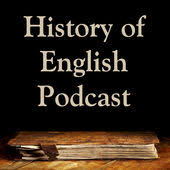Editor’s Note: Do you have a favorite history podcast? Share it! Send your review to the Falcon Banner at rex.deaver@gmail.com

The History of English
“The Spoken History of a Global Language”
By Kevin Stroud
http://historyofenglishpodcast.com/
If you’ve ever looked at an Old English document and wondered how we got from that to now, you’ll love this podcast. Stroud has made what could have been a mind-numbingly boring topic into a fascinating podcast. The podcast began in June 2012 and currently is at episode 106.
He begins with our language’s proto-Indo-European roots, discussing how the people who spoke it came to spread it all over Europe and beyond. He explains how pronunciation shifts occurred, things like how “p” became “f” (like how “pater” became “father”) and how we can trace the development of the language through those consistent changes.
He really hits his stride when he gets to Old English, which he must have studied at some point. Stroud’s a lawyer by profession, but his love of language is plain. He pronounces Old English and Old Norse words clearly, making the subtle differences distinct. His section on pronouns – which are Old English and which are Old Norse – was really good.
In order to show how English evolved, Stroud covers a lot of straight-up history. He discusses what led to the Magna Carta, what conditions led to the publication of the first law books in English, which wars caused which demographic shifts, and so on. He tells the history of England in order to tell the history of English.
Stroud’s website is good, too. He has entries for all his episodes. Some include maps that show migrations or areas where certain languages were prevalent. A couple have audio samples, such as Gregorian chants and a group singing “Sumer Is Icumen In.” I expect as he progresses into the later centuries he’ll have more such resources available.
Stroud also plans to include samples of various English speakers’ accents in future episodes to illustrate the evolution of modern English accents and dialects. On his website he has a place for people to leave a voice sample, asking everyone to list the place where they acquired their accent and say the same 13 sentences, such as “The ten steel beams are still supporting the tin roof” and “The goose took a bath in the mill pond.”
The History of English has an active community who ask questions, offer corrections, and generally comment on the interesting bits of information we learn every two weeks. Most of this is on the website, but there’s also a Facebook page.
Like many podcasters, Stroud has a Patreon page for donations. But his approach to fundraising is low key. He has two audio books for sale, one on Beowulf and the other on the alphabet. “Beowulf Deconstructed: The Old English of Beowulf” is available for $6 or $0.99 each for six chapters. “The History of the Alphabet” is in two parts, each $3.
I listened to the Beowulf audio book, and I liked it, but if you know much about it, or about Old English, it may feel like he’s covering well-tread ground. His focus is on the language, after all. But the best reason to buy these episodes is to support a podcaster who provides his main chronological narrative completely for free. This is especially true of Stroud, who has no ads on his podcast or website.
The History of English podcast currently is in the early 13th century. Recent episodes looked at the Ancrene Wisse, discussed prefixes and suffixes, and the most recent episode looked at the early medieval book trade.

You must be logged in to post a comment.